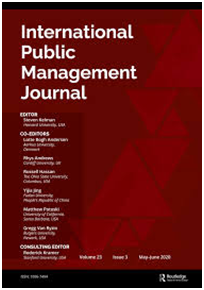International Public Management Journal (IPMJ) officially publishes the Symposium on Public Management in China: Reform, Innovation, and Governance
2020/7/21 16:54:56
International Public Management Journal (IPMJ) is one of the leading academic journalsin the field of Public Management (SSCI). Journal aims to publish high-quality empirical and theoretical work on managing large organizations, particularly public organizations. Recently, Symposium on Public Management in China: Reform, Innovation and Governance was published online in the IPMJ, Volume 23, Issue 3, 2020. It is co-edited by Jiannan Wu, Executive Vice Director of the China Institute for Urban Governance, Distinguished Professor of the School of International and Public Affairs, Shanghai Jiao Tong University, and Richard Walker, Dean and Chair Professor of the College of Liberal Arts and Social Sciences, City University of Hong Kong.

To commemorate the 40th anniversary of China’s reform and opening up, the China Institute for Urban Governance, School of International and Public Affairs, as well as Center for Reform, Innovation, and Governance of Shanghai Jiao Tong University co-hosted the 2017 International Public Management Network (IPMN) Annual Conference, with the theme of"Reform, Innovation and Governance: Improving Performance and Accountability in Changing Times". This symposium comes from outstanding papers collected at this annual meeting. These papers concentrate on the frontier issues and best practice research results of contemporary Chinese public management. They provide in-depth analysis and insights on the reform and innovation of public management in China and the different challenges faced by public organizations. The symposium contains a total of 4 research papers[1] written by well-known experts and scholars in the field of public management which have passed rigorous anonymous peer review. These four articles elaborated on the Chinese government’s multi-faceted exploration and multiple innovation paths in the process of reform, innovation and governance models. The topics include the complex mechanisms behind China’s local government technological innovation, pollution emission control in various provinces in China, career cohorts and inter-jurisdictional innovation diffusion with Chinese characteristics, as well as the reform of central government institutions, etc.
Professor Jiannan Wu and Professor Richard Walker mentioned in the article Public Management in China: Reform, Innovation and Governance that this symposium attempts to advance research on China's reform and innovation. However, there is still much work to be done if we want to fully understand the future of China's reform, innovation and public governance. On the one hand, China’s reforms and innovations occur in every corner of society, and we still need more cases in different policy domains to understand China’s reform initiatives. On the other hand, in addition to features and drivers of reform or innovations, it is also necessary to investigate impacts of reform or innovation initiatives in China and the conditions that make these reforms or innovations effective or not. Only in this way can China’s lessons and experience contribute to the worldwide practice of good governance. Particularly with unexpected outbreak of COVID-19, it is the right time for all the people around the world to refocus and reflect on public management while emphasizing on reform, innovation and governance. When facing the pandemic, we can see how different stakeholder and feeling-holder in different countries have played their roles in different ways when risks and uncertainties that the human beings are facing are continuously increasing. It requires all scholars and practitioners in the public management community to face this new challenge, to shoulder new responsibilities, and to work together to ensure a better future for current and future generations.
The IPMN 2017 Conference and the development and publication of this symposium was made possible by the funding from the China Institute for Urban Governance, School of International and Public Affairs and Center for Reform, Innovation, and Governance of Shanghai Jiao Tong University, as well as the NSFC project titled “Air Pollution, Policy Innovation, and Performance Improvement: An Empirical Study from Mainland China”(71573176).
Symposium link:
https://www.tandfonline.com/toc/upmj20/23/3?nav=tocList
Symposium contains articles:
l Public management in China: reform, innovation and governance
Jiannan Wu & Richard Walker
https://www.tandfonline.com/doi/full/10.1080/10967494.2020.1784646
l Fiscal slack or environmental pressures: which matters more for technological innovation assimilation? A configurational approach
Ziteng Fan, Qingguo Meng & Na Wei
https://www.tandfonline.com/doi/full/10.1080/10967494.2019.1647318
l Performance targets, path dependence, and policy adoption: evidence from the adoption of pollutant emission control policies in Chinese provinces
Pan Zhang & Jiannan Wu
https://www.tandfonline.com/doi/full/10.1080/10967494.2019.1688209
l Career cohorts and inter-jurisdictional innovation diffusion: an empirical exploration in China
Youlang Zhang & Xufeng Zhu
https://www.tandfonline.com/doi/full/10.1080/10967494.2018.1510449
l Same Bed, Different Dreams? Structural Factors and Leadership Characteristics of Central Government Agency Reform in China
Liang Ma & Tom Christensen
https://www.tandfonline.com/doi/full/10.1080/10967494.2018.1450311
[1] Professor Ma Liang and Professor Tom Christensen’s article "Same Bed, Different Dreams? Structural Factors and Leadership Characteristics of Central Government Agency Reform in China" originated from the 2017 IPMN annual meeting and was also regarded as this symposium, but it has been published in advance. Please refer to the IPMJ correction instructions: https://www.tandfonline.com/doi/full/10.1080/10967494.2020.1785748

